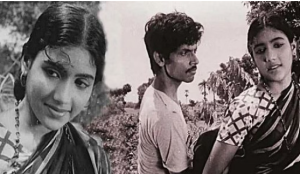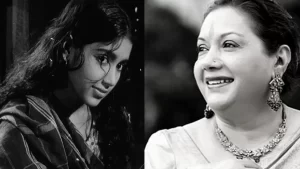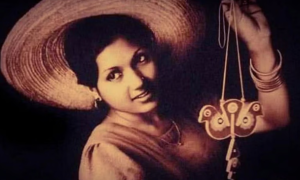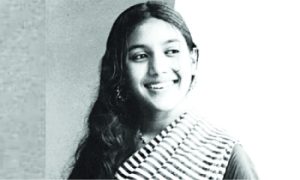Kabori : From Bangladesh’s Sweetheart to Cultural Icon

Early Life and First Steps into Acting
Kabori Sarwar, born Mina Pal on July 19, 1950, in Boalkhali, Chattogram (then East Pakistan), grew up in a family steeped in culture and music. Her father was a bhajan singer, and her siblings learned music, dance, and tabla, creating a vibrant artistic environment at home.
At just 13 years old, she left school in seventh grade at her father’s encouragement to pursue acting. She was discovered by music director Satya Saha, who introduced her to filmmaker Subhash Dutta. In 1964, she debuted in Sutorang, where she received the screen name “Kabori,” meaning “a bun of hair.”

Rise to Stardom: Queen of Romance
Kabori quickly became the quintessential romantic heroine of Bangladeshi cinema. Her on-screen partnership with Razzak produced classics like Nil Akasher Niche, Deep Nebhe Nai, and Ka Kha Ga Gha Umo, defining a golden age of Bangla film romance.
She also took on memorable roles in Titash Ekti Nadir Naam (1973) directed by Ritwik Ghatak, the Urdu film Bahana, and award-winning Bangla films Sujon Sokhi (1975, Bachsas Best Actress) and Sareng Bou (1978, National Film Award Best Actress).

Beyond Acting: Director, Producer, and Author
Kabori was not content to remain just an actress. In 2006, she directed Ayna, a film confronting the issue of acid attacks on women.
As a producer, she worked on projects such as Balaka Mon, Sheeth Boshonto, and Gunda, and contributed to the wartime-themed Ekattorer Michhil.
Her memoir Smritituku Thaak offered an intimate look at her life, her reflections on the film industry, and personal stories from behind the scenes.

Political Involvement and Social Commitment
A committed patriot, Kabori actively supported Bangladesh’s Liberation War in 1971. She fled to India, donated blood for freedom fighters, and participated in cultural programs in Delhi and Bombay to raise awareness about the struggle for independence.
Her dedication to social causes led her into politics. She joined the Awami League and was elected Member of Parliament for Narayanganj‑4 in 2008, serving until 2014. She campaigned for the creation of a dedicated ministry for culture and championed women’s rights throughout her political career.

Personal Life and Legacy
Kabori married twice—first to Chitta Chowdhury and then to Shafiuddin Sarwar (1978–2008). She was the mother of five sons. Despite her fame, she faced personal heartbreaks, unfulfilled romances, and criticism for her political views, revealing the complex, human side of a much-loved star.
She passed away in Dhaka on April 17, 2021, due to complications from COVID-19. Even in death, her legacy is honored—for example, “Kabori Road” in Chuadanga was named in her memory.

The “Mishti Meye” Magic
Kabori’s nickname, “Mishti Meye” (Sweet Girl), perfectly captured her image on-screen: warm, vibrant, and charming. Her romantic pairings with stars like Razzak and Bulbul Ahmed, especially in Sareng Bou and Devdas, became timeless moments in Bangladeshi cinema.
More than an actress, Kabori was a trailblazer who wore many hats: director, writer, producer, activist, and politician. Her commitment to art, social change, and national identity made her a role model for generations.

Selected Films at a Glance
| Film | Year | Highlights |
| Sutorang | 1964 | Debut; won international acclaim (Frankfurt prize) |
| Sujon Sokhi | 1975 | Bachsas Best Actress Award |
| Sareng Bou | 1978 | National Film Award for Best Actress |
| Devdas | 1982 | Classic adaptation co-starring Bulbul Ahmed |
From a talented 13-year-old in Chattogram to a national film legend, Kabori Sarwar’s journey embodied resilience, artistic brilliance, and social responsibility. Her “Mishti Meye” persona, combined with her fierce dedication to art, activism, and politics, continues to captivate Bangladesh and inspire new generations who see in her the enduring spirit of a true cultural icon.






















